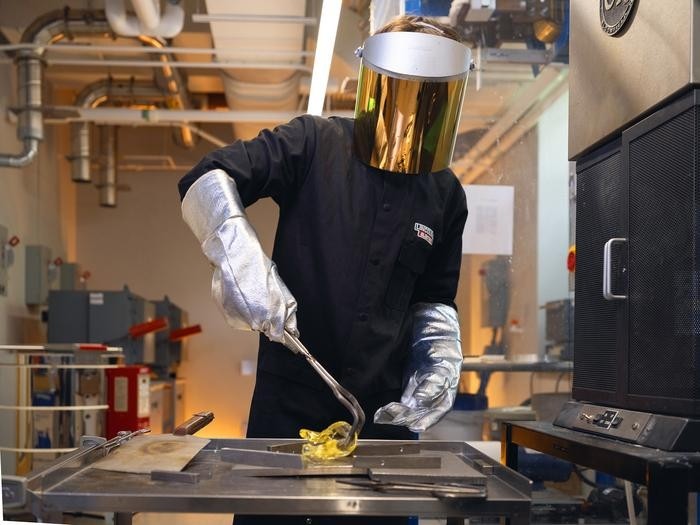Image Michael Owen/ Penn State Italian glassmaker for cosmetics and fragrance Bormioli Luigi has partnered with LionGlass to help bring its sustainable alternative to soda lime silicate glass to the wider market.
Lionglass, which was engineered by researchers at Penn State University in Pennsylvania, has secured its first business partner with Bormioli Luigi, an Italian glassmaker that specialises in high-end packaging for fragrance, cosmetics and tableware.
The official R&D partnership aims to scale up, manufacture and commercialise LionGlass, a new type of glass that offers an alternative to soda lime silicate glass.
Soda lime silicate glass, which has been used for thousands of years, is not very eco-friendly to produce. The material is made by melting quartz sand with carbon-based ingredients (soda ash and limestone) at high melting temperatures of about 1,450 degrees Celsius.
According to LionGlass, the high energy requirements for melting traditional soda lime silicate glass accounts for 70% to 80% of the substance’s carbon footprint, while the remaining 20% to 30% comes from decomposition of its carbonate batch materials, which release CO2 into the atmosphere.
“A more sustainable glass with far less carbon dioxide”
“This is an enormous opportunity to work with this material and create a more sustainable glass with far less carbon dioxide (CO2) emissions and energy consumption than standard glass,” said Elisa Biavardi, who is chemical laboratory manager for Bormioli Luigi.
“I see it also as an opportunity to learn from one another as we explore the possibilities for this major innovation in glassmaking,” she added.
The partnership will focus on scaling up LionGlass to create bottles for luxury beauty products like cosmetics and perfume. According to Biavardi, by focusing on a smaller, luxury market, the glassmaker can fine-tune the glass and determine the feasibility of scaling it up further for other uses.
Glass manufacture producing over 86 million tonnes of carbon dioxide every year
The co-inventor of LionGlass and Penn State University Professor, John Mauro, siad that LionGlass, which eliminates the use of carbonate batch materials and has a melting temperature roughly 400 degrees Celsius lower than other everyday glass products, has the potential to cut the carbon footprint of glass manufacturing in half.
Mauro said that the new material also offers improved damage resistance compared to soda lime silicate glass. “It’s roughly 10 times more crack-resistant, which could enable ‘lightweighting’ of glass products, further reducing the carbon footprint of glass production by lowering the carbon emissions used to transport the glass,” he said.
Last year, the university filed a patent application for the composition of the first generation of LionGlass. It also recently filed a second provisional patent application for the next generation of the material.
Scaling up production
Until now, LionGlass has been made in a lab setting using a crucible. But to produce the material on an industrial scale, it must be melted in large batches inside massive furnaces and be formed using moulds, something that has not yet been tested.
The first year of the partnership will be dedicated to testing the feasibility of using the moulding technique at Bormioli’s manufacturing infrastructure.
“This all started as just an idea in our lab, and now we’re partnering with companies to bring it out into the world,” said Nicholas Clark, a postdoctoral fellow at Penn State and co-inventor of LionGlass.
“We’re translating what we’re learning from the crucible melting that we’re doing here at Penn State to a much larger scale of continuous glass production that’s being done at Bormioli. It’s exciting for our work to be this close to a major industrial innovation,” Clark concluded.

